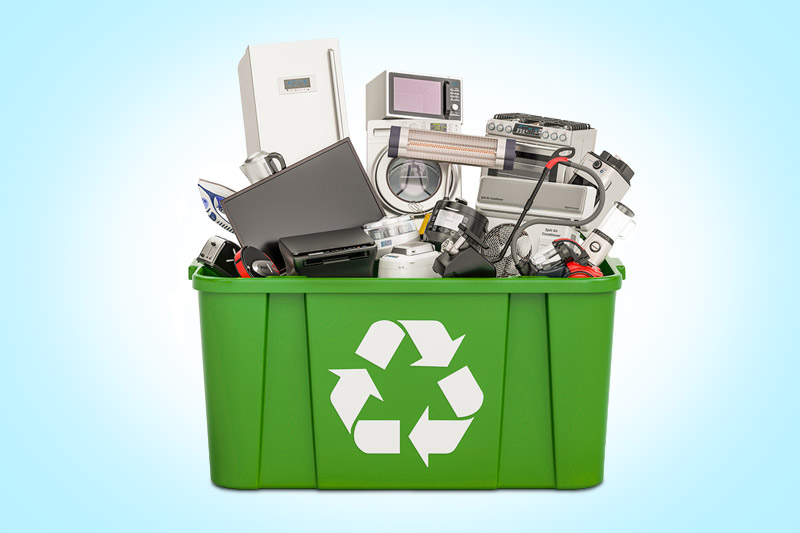R2 Certification Electronics Recycling: Your Assurance for Responsible Disposal
R2 Certification Electronics Recycling: Your Assurance for Responsible Disposal
Blog Article
Master the Needs of R2 Accreditation to Make Sure Sustainable Company Practices
At the center of this movement is the R2 certification, an extensive requirement that establishes the bar high for electronics recyclers and refurbishers. As services make every effort to line up with eco aware techniques, understanding the demands of R2 accreditation is critical. In a globe where sustainability is no longer a simple buzzword but an organization necessary, diving into the ins and outs of R2 certification is a critical move that can pave the way for long-term success and favorable ecological effect.
Relevance of R2 Accreditation
Achieving R2 Accreditation is crucial for organizations intending to show their dedication to accountable and lasting electronic waste monitoring practices. This accreditation, created by SERI (Sustainable Electronics Recycling International), establishes the standard for accountable reusing methods in the electronics sector. By acquiring R2 Certification, organizations signal to their stakeholders that they abide by stringent ecological, wellness, and safety policies while handling digital waste.
One of the crucial reasons that R2 Accreditation is very important is its emphasis on sustainability. With digital waste being a substantial international problem, organizations require to showcase their dedication to minimizing the ecological influence of their operations. R2 Accreditation calls for firms to execute processes that make sure the proper handling, repair, and recycling of digital waste, therefore contributing to the round economic situation and lowering the buildup of e-waste in land fills.
In Addition, R2 Certification boosts a company's online reputation and reputation. In today's eco mindful market, consumers and companions are increasingly looking to collaborate with businesses that focus on sustainability. By achieving R2 Accreditation, business can differentiate themselves as leaders in accountable e-waste administration, gaining an affordable edge and attracting like-minded stakeholders.
Secret Components of R2 Criteria

Steps to Obtain R2 Accreditation
To get R2 Qualification, organizations must thoroughly show conformity with a collection of stringent criteria and standards. The process of getting R2 Accreditation entails a number of essential steps. The primary step is to acquaint oneself with the R2 Criterion and its needs. This consists of understanding the principles of responsible recycling, information safety, environmental Go Here management, and worker health and safety and security that develop the structure of the certification.
Next, services need to evaluate their existing methods and procedures to recognize any kind of gaps that need to be addressed to satisfy the R2 Criterion. This may entail applying brand-new treatments, investing in training programs, or making adjustments to existing procedures. As soon as any type of shortages are corrected, companies can continue to establish a detailed management system that aligns with the R2 requirements.
Following the implementation of the needed changes, companies have to undertake a third-party audit to confirm their compliance with the R2 Requirement (r2 certification). This audit is conducted by an approved certification body and includes a complete evaluation of the organization's facilities, procedures, and documents. Upon effective completion of the audit, organizations can receive their R2 Accreditation, showing their commitment to sustainable and responsible company practices
Benefits of R2 Compliance
Companies that stick to R2 conformity requirements can open a myriad of benefits in today's sustainable organization landscape. Additionally, R2 compliance advertises ecological sustainability by guaranteeing that digital waste is handled in an eco pleasant manner, decreasing the impact on landfills and natural resources. On the whole, attaining R2 compliance not just assists businesses fulfill regulative needs however also cultivates a society of environmental responsibility and functional quality.
Keeping R2 Qualification
Demonstrating a continued commitment to accountable electronic waste management practices, organizations must concentrate on the thorough procedure of keeping R2 certification. Maintaining R2 accreditation includes routine audits, interior evaluations, and constant improvement efforts to make sure conformity with the rigorous demands set forth by the Responsible see post Recycling Practices (R2) criterion. Organizations should remain attentive in checking their digital waste administration procedures, information safety procedures, and overall ecological performance to support their R2 accreditation status.
Normal training and education and learning for workers are vital to preserve R2 certification, as personnel participants need to be knowledgeable regarding the current finest practices and industry criteria. Maintaining detailed documents and paperwork of digital waste recycling activities, downstream suppliers, and inner procedures is crucial for demonstrating compliance during audits.
Moreover, organizations must actively involve with their supply chain partners and imp source vendors to make certain that all entities entailed in the digital waste monitoring process stick to R2 requirements. By cultivating a culture of openness, responsibility, and continuous renovation, businesses can successfully preserve their R2 accreditation and maintain their dedication to lasting business practices.
Conclusion

Achieving R2 Certification is crucial for services intending to demonstrate their dedication to responsible and sustainable digital waste management methods. By getting R2 Qualification, organizations signal to their stakeholders that they stick to stringent ecological, wellness, and security laws while managing digital waste.
Upon effective completion of the audit, businesses can receive their R2 Certification, demonstrating their dedication to lasting and accountable service practices.
Keeping R2 qualification entails regular audits, interior testimonials, and continuous enhancement efforts to ensure compliance with the rigid demands established forth by the Accountable Recycling Practices (R2) criterion. By comprehending the essential elements of R2 requirements, taking the essential actions to acquire qualification, and enjoying the advantages of R2 compliance, services can show their commitment to accountable electronic waste administration.
Report this page